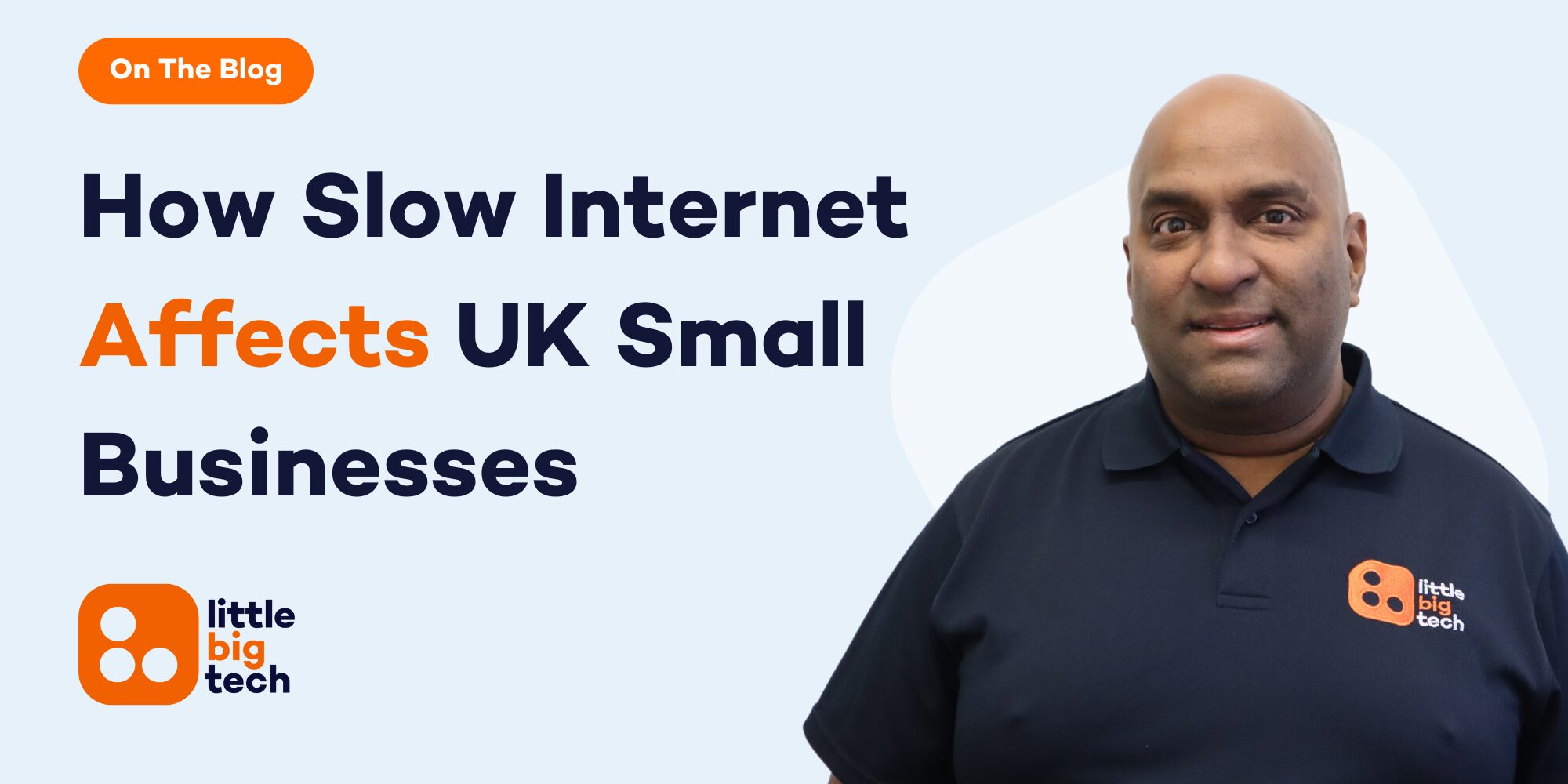How Slow Internet Affects UK Small Businesses
Slow internet is more than just an inconvenience it can have a serious impact on small businesses. Slow internet is affecting UK small businesses in many ways that may not always be obvious but are just as damaging. Whether it’s affecting productivity, customer service, or your bottom line, slow internet can harm a business’s reputation and performance.
In 2025, every business, big or small, relies heavily on the internet to function smoothly. Small businesses, in particular, are often vulnerable to the effects of slow internet speeds. From slow download and upload speeds to delayed communications, these issues can create delays in tasks and make everyday operations a lot harder.
Slow internet can lead to a drop in employee productivity as time is wasted waiting for files to upload or download, video meetings to buffer, and cloud-based software to load. For businesses that rely on online transactions or digital marketing, it can lead to poor customer experiences, damaged reputation, and lost sales. The longer these issues persist, the harder it becomes to compete with faster, more efficient competitors.
In this article, we’ll explore 9 subtle but malicious ways slow internet affects UK small businesses. These issues can easily go unnoticed but ultimately affect the efficiency and success of your business. By understanding these challenges, you’ll be in a better position to take steps toward improving your internet speed and ensuring your business operates at its best.
1.Wasted Time On Basic Tasks
When it comes to running a small business, time is one of your most valuable resources. Every minute spent waiting on slow systems is a minute not spent helping customers, closing sales, or growing your business. Sadly, this is a daily reality for many UK small businesses with poor internet speeds.
Slow internet makes even the simplest tasks take longer than they should. Uploading a document to the cloud, sending files to clients, or even loading a webpage can become time-consuming jobs. What should take seconds ends up taking minutes. Multiply that by the number of employees and the number of tasks they complete each day, and the hours lost each week quickly add up.
For teams working with shared online documents or cloud-based software, lagging internet creates frustration and stops people from doing their jobs efficiently. Waiting for a system to load or for a file to send shouldn’t be part of anyone’s job description, yet it becomes part of the routine for many employees dealing with slow speeds.
This wasted time doesn’t just hit productivity, it impacts morale too. Staff get frustrated, customer service slows down, and deadlines become harder to meet. It creates a chain reaction that spreads through the whole business.
In many cases, the cost of lost hours far outweighs the cost of upgrading to a faster and more reliable connection. It’s a hidden drain on your business that could be easily fixed but continues to do damage every day it’s left unchecked.
Slow internet affects UK small businesses silently but steadily. If your team is constantly pausing for systems to catch up, it’s time to ask yourself whether your internet is helping your business or quietly hurting it.
2. Poor Video Call Quality Disrupts Business Communication
Video conferencing has become a normal part of work for most UK small businesses. Whether you’re meeting with clients, hosting team check-ins, or joining supplier calls, a reliable connection is vital. But slow internet affects UK small businesses when these meetings start to go wrong.
It often begins with small issues. A frozen screen, a delay in someone’s voice, or a screen share that takes forever to load. Suddenly, what should be a simple 15-minute update turns into 45 minutes of repeating yourself, apologising for the connection, and hoping the call doesn’t drop again.
Clients might smile through the frustration, but it can harm your professional image. A choppy video call gives the impression that your systems are not up to standard. For first-time clients, that shaky first impression may be hard to undo.
Internally, the problems are just as serious. Staff may miss important updates or feel left out of key decisions simply because the call quality was poor. Over time, this can affect morale and productivity. You want your team to focus on solving problems, not struggling to hear what’s being said.
When the internet is slow, shared files lag behind, voices overlap, and the meeting flow breaks. If someone is working from home on a weak connection, it creates a disjointed experience for the whole team.
Slow internet affects UK small businesses especially during high-stakes moments, such as a pitch or a meeting with a potential investor. These are the times when everything needs to work smoothly. The quality of your internet should never be the reason you lose a client or delay a deal.
Fixing this isn’t about buying fancy gear. It starts with having the right internet solution in place. Your business deserves clear, uninterrupted calls every time.

3. Cloud-Based Tools Work Slower And Waste Time
Many small businesses in the UK rely on cloud-based tools to run daily operations. From storing files in Google Drive to using software like QuickBooks, Trello, or Monday.com, everything depends on fast and reliable internet. But when the connection is poor, cloud tools become a daily frustration instead of a help.
Opening a spreadsheet stored online shouldn’t take five minutes. Neither should updating your CRM or sending over a shared invoice link. Yet this is what happens when your connection is dragging. Even refreshing a browser page can become a waiting game.
This not only wastes time, but also interrupts the natural flow of work. Staff end up waiting for files to load or syncing errors to fix themselves. You might click something, nothing happens, so you click again and suddenly it crashes. These small delays eat away at productivity, hour after hour.
Slow internet affects UK small businesses especially when several people are trying to work online at once. For example, if a team of five is all logged into cloud-based apps during peak hours, your network can choke. The result? Everything grinds to a halt.
It’s also common to lose unsaved work due to syncing problems. One moment you’re typing in an online document, and the next, your changes are lost because the internet blipped. That’s not just annoying it’s costly. Work may have to be redone, and critical changes may never reach the final version.
Another impact is the inability to switch between tasks quickly. If it takes too long to access files, reply to emails, or launch a new browser tab, then workers fall behind. This can slow down entire departments, especially in admin-heavy roles where speed matters.
Slow internet affects UK small businesses in deeper ways when cloud tools don’t function properly. It stalls your entire workflow, lowers staff morale, and increases errors. If you’re investing in cloud-based tools, you should also invest in reliable internet because the tools only work as well as your connection does.
4. Missed Customer Opportunities
When a small business runs on a slow internet connection, it doesn’t just affect staff productivity. One of the biggest risks is losing direct customer interactions. Whether it’s a local bakery taking online orders or a high-street boutique offering virtual shopping, customers expect fast and reliable service online. If the website takes too long to load or the booking page times out, they’ll leave often without a second thought.
In 2025, people are used to things working quickly. If your online experience isn’t up to scratch, potential customers may assume your services or products won’t be either. Slow internet means pages lag, live chat systems drop out, and online forms fail to submit properly. It frustrates the user and makes your business look behind the times.
Customers also want real-time responses. Many small businesses now rely on platforms like WhatsApp, Facebook Messenger, or live chat software to talk to customers instantly. But a slow connection can delay your replies, causing buyers to look elsewhere. This is especially true for urgent requests, where timing is everything. A delay of even a few minutes can cost you the sale.
There’s also the issue of video content. Many small businesses now use short videos for promotions or customer engagement. A sluggish internet connection can ruin uploads, buffer livestreams, and lower the overall quality. It makes your marketing efforts seem sloppy and unprofessional, which again reflects badly on your brand.
This is another way slow internet affects UK small businesses, particularly those trying to grow their customer base through online channels. Whether it’s social media campaigns or responding to enquiries, every delay makes your business less competitive. In the end, customers don’t care why the delay happened, they just move on. And once they’re gone, it’s hard to win them back.
5. Delays In Order Processing And Payments
For small businesses in the UK, a smooth customer journey isn’t just about great service it depends heavily on reliable internet. One of the most damaging ways slow internet affects UK small businesses is by creating serious delays in processing orders and payments. This is a key stage in every transaction, and if it goes wrong, it damages trust.
When your internet is slow, your point-of-sale systems can freeze, crash, or time out entirely. This is especially dangerous during peak periods like lunch breaks in a café, the Saturday rush in a retail store, or during limited-time online sales. Even a few seconds of delay when processing a card payment can feel like an eternity to a customer waiting at the till. It makes you look unprofessional and unprepared.
Online transactions can suffer even more. If customers face issues trying to place an order through your website from page errors to failed checkouts they may not return. In fact, many abandon their cart entirely if the process takes too long. This leads to missed revenue and low conversion rates. Worse, a competitor with a faster platform is just a click away.
There’s also the risk of double charging or payment errors when systems lag. That creates extra admin work, refunds, and unhappy customers. When a simple payment becomes a hassle, it damages your reputation. People may post negative reviews or warn others not to shop with you. It’s hard to bounce back from that kind of public feedback.
Finally, delayed order confirmations and shipping updates leave customers in the dark. Automated email systems might fail to trigger, and stock updates don’t appear in real-time. This is how slow internet affects small businesses by disrupting operations in ways that directly hurt customer experience and trust. And when trust is lost, so is repeat business.

6. Poor Inventory And Order System Syncing
A hidden way slow internet affects UK small businesses is through delayed syncing between inventory systems, order platforms and point-of-sale devices. Many businesses today rely on cloud-based systems to handle stock levels, sales records and customer data in real-time. But when the internet connection is slow, these processes break down quietly and expensively.
Picture a small shop or café using an online till system. A customer makes a purchase, but the system lags. The sale doesn’t register right away. Later, when the team checks stock, the item appears available even though it was sold hours ago. If another customer places an order for it online, the business now faces the awkward situation of cancelling and refunding and likely losing that customer’s trust.
The bigger the inventory, the bigger the problem. Retailers with hundreds of SKUs or service-based businesses managing bookings and equipment loans need constant syncing between all devices. A slow connection causes mismatches, errors and confusion. Orders might not come through to the warehouse, delivery updates can be delayed, and your team might have to spend hours fixing avoidable mistakes.
This type of delay also hits customer service hard. If your team can’t see real-time updates, they give out wrong information. Promising an item is in stock when it’s not damages your credibility. Even worse, if customers try to track their delivery and the system hasn’t updated, they start to lose confidence and become hesitant to return.
7. Damaged Online Reviews And Reputation
One of the most overlooked ways slow internet affects UK small businesses is by damaging how your business appears online. In a world where first impressions are made on Google, Trustpilot, or social media, a poor experience caused by slow service , often down to internet lag can push unhappy customers to leave negative reviews before you even realise there’s a problem.
Let’s say you run a local IT repair shop or independent retailer and rely on an online booking system. A customer tries to schedule an appointment, but your site takes too long to load or the confirmation never reaches them because of lag. They assume your business is disorganised, and worse still, they may not even tell you. They just leave a one-star review.
This happens more than most small business owners realise. Delays in replying to online messages, customer support chat freezing, or a payment gateway taking too long to respond are all tiny issues individually. But to a paying customer, these are big red flags. They’re signals that your business might not be reliable. And in 2025, reliability is everything.
Slow systems also limit how quickly your team can deal with problems. If a customer messages about an issue but the internet prevents your staff from replying fast, that delay alone can create frustration. When people feel ignored or delayed, they take their anger public. And once a bad review is online, it’s there permanently, influencing every new visitor who searches your name.
If slow internet affects UK small businesses by leading to these reviews, the long-term cost is trust. You lose it quickly and gain it back slowly. Businesses in the UK need to understand that keeping up with customer expectations isn’t just about what you say, it’s about how fast and smoothly you deliver it. A faster internet connection protects your reputation, keeps your online channels professional and gives every visitor a smoother experience that makes them more likely to return, recommend, and review positively.
8. Missed Growth Opportunities From New Tools
In 2025, most new digital tools for small businesses are built to be fast, cloud-based, and constantly online. But if your internet is slow, you’re not just lagging behind, you’re missing out on the future altogether. This is one of the silent ways slow internet affects UK small businesses, especially those trying to scale up or modernise how they work.
Cloud accounting platforms like Xero, marketing tools like HubSpot, or even AI-driven customer service software are only useful if they can run properly. When your team is stuck waiting for a system to load or freezes halfway through using a new tool, they eventually stop using it. That means wasted subscriptions, wasted time, and worst of all, missed growth.
Let’s imagine you’re a small design agency in Hampshire. You want to use Figma for collaborative design or even Zoom for team updates. These tools are designed for efficiency but rely heavily on real-time syncing. With a weak connection, your staff end up working twice as hard just to keep up. In some cases, the tools can’t even function properly at all.
That lack of proper usage holds businesses back from better workflows and reduces productivity. More importantly, it stops you from trying out tools that could give your company a real edge. While competitors use automation, instant reporting, or live data dashboards, you’re still waiting for a spreadsheet to download.
This is how slow internet affects UK small businesses without owners even noticing at first. The issue doesn’t just stay in the IT department, it leaks into marketing, sales, customer service, and decision-making. The longer you’re stuck on slow speeds, the harder it becomes to adopt tools that push your business forward.

9. Poor Online Reviews Due To Lagging Service
Online reviews play a massive role in how small businesses are seen today. What many business owners don’t realise is that slow internet affects UK small businesses not just behind the scenes, but right at the point of customer service where first impressions are made and public feedback is shaped.
When your internet connection is unreliable, it can delay everything from card payments at the till to customer support replies via live chat. If a customer is kept waiting for more than a few seconds, especially in a fast-paced environment like retail or hospitality, they don’t just get annoyed, they remember it. And very often, they share that bad experience online.
Reviews mentioning “slow service” or “unhelpful staff” are often not actually about your team’s attitude, they’re about the delays caused by lagging internet. A coffee shop may serve excellent drinks, but if the Wi-Fi keeps dropping when customers try to use your loyalty app, or your payment system freezes, people will leave negative feedback. And once those reviews are posted, they’re difficult to undo.
This is a serious problem because online reviews are one of the first things potential customers look at. One-star ratings or consistent complaints about speed can scare off new business, even if you’ve got a great team and offer quality services.
What’s more, platforms like Google, Trustpilot, and TripAdvisor don’t ask why the service was slow, they just show the result. So, even when the fault lies with your internet provider, it’s your business that takes the hit.
This is another clear way that slow internet affects UK small businesses: it creates a negative feedback loop. Poor speed causes poor service, which causes poor reviews, which then reduces foot traffic and online sales.
The fix isn’t about better PR or training staff to handle complaints. The real solution starts at the network level. Upgrading to faster, more stable internet ensures your team can respond quickly, your systems stay online, and your customers leave happy and hopefully with a 5-star review to prove it. That way, your digital reputation reflects the real quality of your business.
Why We Recommend Fixing The Problem Now, Not Later
As we’ve seen, slow internet affects UK small businesses in ways that go far beyond buffering screens and waiting wheels. From payment delays and dropped video calls to frustrated staff and lost customers, the cost of poor connectivity builds up fast. These problems can quietly chip away at your reputation, productivity, and revenue.
At Little Big Tech, we understand how these issues impact real businesses every single day. We’ve worked with cafés struggling with laggy card machines, shops losing online orders due to disconnections, and offices where staff lose hours each week to upload failures and stalled calls. These aren’t just minor inconveniences. They’re problems with real consequences.
The good news? They’re all fixable. Whether your team works from a small high street shop or a hybrid office setup, there are reliable, fast and affordable internet solutions available and customised to your size and needs. We help small businesses upgrade their broadband, configure backup systems, improve Wi-Fi coverage and speed up every tool that keeps your business moving.
The difference this makes is immediate. Faster internet means happier customers, smoother systems, better reviews, and a more motivated team. And perhaps most importantly, it puts you in a strong position to grow, expand online, or offer more connected services with confidence.
If you’ve read through these 9 signs and thought “this sounds like us,” then don’t wait for it to get worse. Let’s sort it now, before another customer leaves or another opportunity slips away.
We’re Little Big Tech and we specialise in helping small businesses like yours get fast, secure and stable internet that actually works.
Call us today on 03333 055 331 or visit our website to find out how we can help you stay ahead. Because no business should be held back by a slow connection not when there’s a faster fix waiting.








